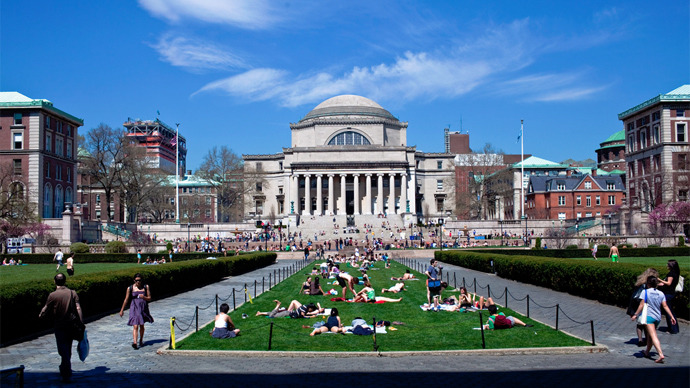Columbia University still has 'whites only' scholarship

Columbia University still offers a “whites only” tuition fellowship, which is restricted to “a person of the Caucasian race” and may be in violation of the US Constitution, a Manhattan Supreme Court wrote in papers filed Monday.
Facing massive condemnation upon the discovery of this discriminatory restriction, Columbia University has called for an end to the scholarship program that came out of a fund now worth about $800,000.
The Lydia C. Roberts Graduate Fellowship, which was established in 1920, only considers Americans who are from Iowa, not studying law, “of the Caucasian race”, and returning to Iowa for at least two years upon graduation. A court order is required in order to change the conditions of the fellowship.
Roberts was a wealthy woman and heir to her husband’s medical patent-company. She left most of her $509,000 estate to Columbia when she died in 1920, created the rules of the restrictive fellowship herself. Along with the race requirement, she specified that fellows “may not concentrate their studies in law, medicine, dentistry, veterinary medicine, or theology.”
Columbia has not awarded the fellowship since 1997, and is now seeking to acquire a court order to change the race provisions of the fund before it continues bestowing it, the New York Post reports.
“Circumstances have so changed from the time when the Trust was established,” making it “impossible” to comply with the requirements of the scholarship, states the affidavit filed with the Manhattan court. “Columbia University is now prohibited by law and University policy from discriminating on the basis of race.”
During the late 1970s and early 1980s, students at Columbia University launched hunger strikes and barricaded school buildings to protest the university’s investments in companies that were supporters of the South African apartheid. Restricting a fellowship to “whites only” starkly contradicts the diversity and tolerance that the school and its students have boasted for decades.
According to its 2010 figures, only 42 percent of the school’s undergraduate and 39 percent of the school’s graduate population was white, while the remainder was comprised of minorities. It comes as a surprise that a school as diverse as Columbia has not sought to alter the racist provision of its fellowship before, which the National Association for the Advancement of Colored People has questioned since 1949.
At the time, Provost Grayson L. Kirk defended the racial provision.
“We do not feel we are justified in depriving some of our students of the benefits of restricted grants simply because they are not available to everyone,” he told the NAACP in 1949, the Post reports.
When the scholarship was first awarded in 1920, it provided recipients with at least $750, which was significant considering that the annual cost of tuition was only $180. When the fellowship was last awarded in 1997, it provided students with $22,000, which is currently the equivalent of nearly one semester’s worth of tuition costs.
But the school would like to restart the scholarship, making it available to Iowans of all races. Nearly 50 years after the end of Jim Crow laws, the university is finally taking long-overdue steps to eliminate racist policies from its awards -- policies that have remained hushed-up for decades.
"I didn't even know there were requirements of race," Douglass Gross, a Caucasian attorney who was granted the fellowship in 1976, told the New York Daily News. "All I knew is that you had to be from Iowa. And, since I was from Iowa, it was pretty easy to do."













